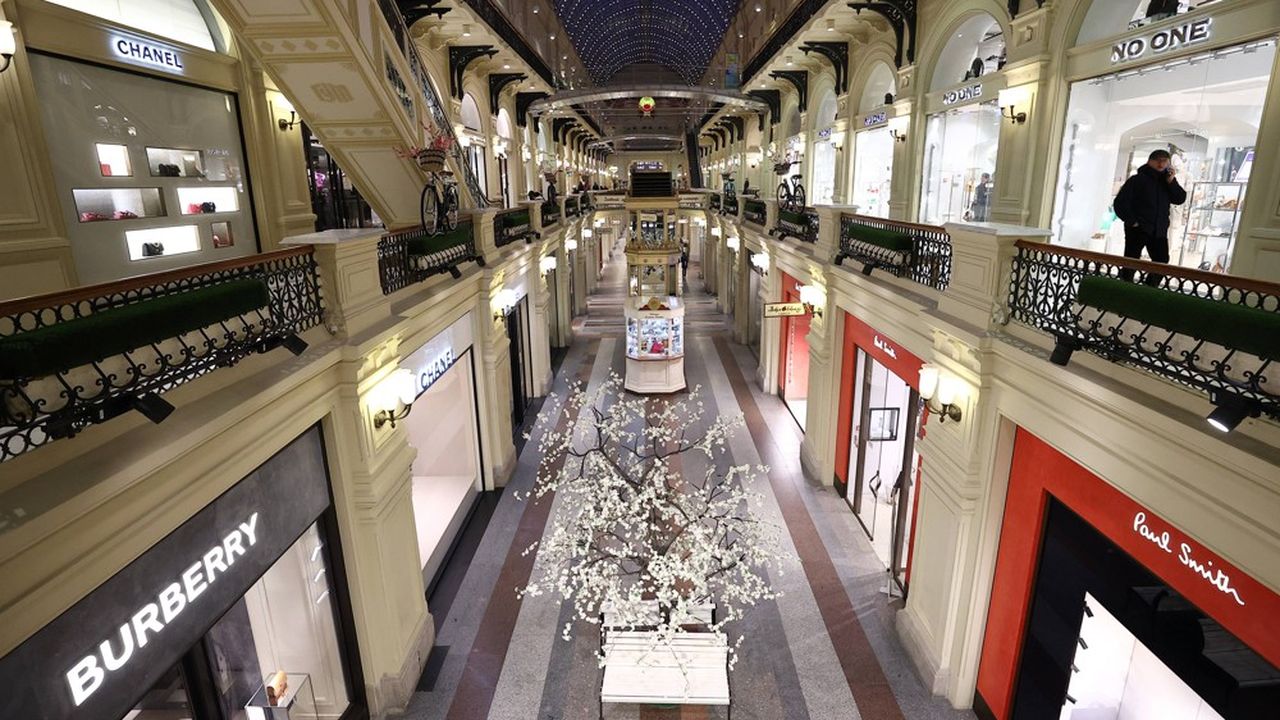Posted Jul 8, 2022, 12:25 PM
February 24, 2022, Russia launches “its special operation” in Ukraine. The first images of destruction gripped public opinion with dread as waves of refugees began to arrive in European capitals. It is astonishment. In an often martial tone, Western leaders promise an unprecedented response and unleash a salvo of unprecedented economic sanctions.
“We are going to cause the collapse of the Russian economy,” thunders the Minister of the Economy, Bruno Le Maire. In the aftermath, press releases from international companies rain down to announce their more or less total withdrawal from Russia. It’s the return of empty shelves in Russian stores, some prophesy.
Four months later, the results are mixed, even blurred. Let’s stroll through Moscow: at the supermarket, the shelves are stocked. Heineken, Coca-Cola, Sprite, still sit on the shelves, alongside Baltika, the favorite Russian beer brewed by the Dane Carlsberg. At the checkout, you can continue to pay for your purchases with a Visa card if it was issued by a Russian bank.
Supermarket shelf in Moscow.Benjamin Quelle
Direction the most chic avenue in the capital: a poster on the front of a Louis Vuitton sign (LVMH group, owner of Les Echos) announces a “temporary closure” for “technical” reasons. But the most Francophiles can always sit down at Paul’s to enjoy a pain au chocolat with a coffee. In the city’s major shopping centers, a series of brands like Zara are plunged into darkness, their storefronts closed, while the Ladurée salons, taken over by its local franchisee, have become the “cafes of Paris”. They still offer macaroons, but they are produced on site, instead of being imported.
The L’Occitane brand is now displayed in Cyrillic and the stores have kept their sunflower yellow storefronts, even if the group has left. The McDonalds, passed into the hands of a Russian, lost their ark and their Big Mac while nothing has changed at Burger King.
Gap
“There is a big gap between announcements of departures imposed at the time by pressure from investors and public opinion and the current reality”, explains Alberto Alemanno, professor of law and taxation at HEC. “At the time, the fact of not taking a position could make you perceive as an accomplice of Russia and the Kremlin evoked the threat of a nationalization of the companies. This threat did not materialize and the pressure from public opinion ceased,” he adds.
Yale University has done the count: in total, a thousand foreign companies have announced a reduction to varying degrees of their activity in Russia. She therefore wanted to establish a ranking: the list of companies that leave and that of companies that remain, before coming up against a much more complex reality. Its census, which is a benchmark in the world, now contains five categories from groups that maintain their activity in Russia at all costs to those who have cut ties to those who are trying to buy time.
Because in the stupor of the beginning of March, some companies rushed to announce their departure without always measuring the difficulty of the operation. This is particularly the case for groups – often with an activity directly linked to consumers – subject to pressure from the general public, the media and certain NGOs.
If the distributor Auchan or the agri-food group Lactalis decided to back down, Renault quickly sold its assets to the Russian state for almost nothing, barely trying to negotiate, it is said on the Russian side. Societe Generale was the first bank to withdraw from the country, selling off Rosbank to a Russian oligarch. These two operations, by leading companies, created amazement.
“Originally, it was said that if international industry left Russia, it would be a real damage to the Russian economy and that, as a result, the country’s elite might turn against the Kremlin. But if we look at the current situation, there is a risk that the opposite will happen. The economic elite will do business, by renationalizing economic activity at a low price,” says Alberto Alemanno.
50 shades of departures
Frightened by the prices accepted by Renault and Société Générale and faced with the difficulty of finding a buyer who is not under sanction, many Western companies have chosen to sell their activities to local management.
This is for example the case of Publicis, Schneider Electric, the automobile distributor Inchcape, the tire manufacturer Michelin or even Sodexo, which sold its subsidiary of 6,000 employees to its local leaders.
At the end of May, L’Occitane also sold the business to the local management team. The group no longer supplies products to Russian retailers and no longer has links with its former subsidiary. “The new management was allowed to use the logo in Cyrillic during a transition period,” said a spokesperson, however.
The big names in auditing have also ceded their activities to local management. Deloitte, which employed more than 2,000 people in 8 cities in Russia, has renamed itself Business Solutions and Technologies. The former subsidiary of PwC continues its activity under the name “Technologies of trust” while that of EY has been renamed “Audit Technologies and Solutions Center – Audit Services. »
Many foreign companies are leaving in this way, while remaining behind the scenes and not closing their doors.
A Frenchman living in Moscow
This type of approach has the advantage of sparing the goat and the cabbage. One can, for example, consider clauses for subsequent recovery, allowing the subsidiary to be reintegrated once the war is over, at a predetermined price. “Many foreign companies are leaving in this way, while remaining behind the scenes and not closing their doors. It is a question of being pragmatic above all”, explains a French leader installed in Moscow.
The sale of subsidiaries to local managers also suits the Russian bankers with whom these companies had debts. Very active, Sberbank has also launched a new department to financially support managers who take over subsidiaries. He is a Russian living in Switzerland who specifically returned to Moscow to lead the project.
Intermediate option: managerial autonomy. The management of the Russian subsidiary is entrusted to Russians and operates in quasi-autonomy. In practice, the borders remain porous and a large French industrial group having opted for this solution has in fact entrusted a Frenchman, under local contract, with the supervision of the entity on site. This company has succeeded in reducing imports by obtaining supplies from China and Turkey if necessary, but 1% of its components are still shipped from Germany or Japan, for lack of substitutes.
Temporize
At the beginning of the conflict, many Western companies condemned the invasion and suspended their activity or their investments without taking a definitive decision. The idea was to temporize while waiting for a reassessment of the reputational risk. But over time and as the conflict in Ukraine took hold, several big names like Ikea, Coca-Cola, McDonald’s and most recently Nike have ended up pulling out of the market in recent weeks.
Between an announcement and an effective implementation, however, there can be a world. At the end of March, Burger King explained that the complexity of its contracts with its franchise partners prevented it from stopping its activities in Russia. Carlsberg, which owns eight breweries in Russia and employs 8,400 staff, announced in April that its withdrawal could take up to 12 months.
At the end of March, just like the law firms Linklaters, Clifford Chance or Baker McKenzie, Allen & Overy announced its departure from Russia. However, at the end of May, the company indicated that it had advised Société Générale on the sale of Rosbank with the participation of its Moscow office. “We are in the process of stopping our activities in Moscow in view of the closure of the office and we have tried by all means to find the best solutions for our colleagues”, explains the firm. With this in mind, Allen & Overy offered most of them to join the department dedicated to the CIS/Russia zone outside the country. If they accept, they will move to Dubai, where a new hub is being set up.
Many are still reluctant to leave the market
A French leader
A withdrawal does not necessarily lead to an ideal situation either. In mid-April, Obi, Leroy-Merlin’s German competitor, sold its Russian business to an unknown investor after a few ups and downs. According to the “Handelsblatt”, the Russian management first tried to reopen the stores of the family business on its own, which forced the headquarters to disconnect the cash registers from the servers to block the initiative.
Today the stores have reopened, the Russian site is working but still with the name of the German company. At the end of April, the family group reaffirmed that the transaction meant that the investor would stop using the Obi brand. “We would like to remind you that the Obi Group is and will not be active in Russia, directly or indirectly, after the transaction. Any announcement to the contrary can only be propaganda from Russia, over which, as a society, we have no influence.
Not to mention that leaving can put foreign companies “at risk from a contractual point of view vis-à-vis their local counterpart, vis-à-vis the Russian authorities who do not fail to pop in from time to time to check that we are continuing to work”, explains Olivier Attias of the August-Debouzy cabinet.
Many still hesitate
All in all, the approaches vary a lot according to the European countries. “The Scandinavians are the ones who made the most outspoken decisions. Probably because of greater pressure from public opinion,” explains a French leader.
According to counts made by Yale University, departure announcements are more important among American or German companies than among French companies, the first foreign employers in Russia.
“The particularity of the Russian economy is that it is relatively less developed, less integrated into globalization (…) but it is an economy which is on niches, which has strong points”, explains Sylvie Matelly, deputy director of the Institute of International and Strategic Relations (IRIS), citing in particular raw materials. “There are things you won’t do elsewhere.”
“Working in Russia is more profitable than elsewhere. This is the reason why many are reluctant to leave the market,” confirms the French leader.
–


